- Home
- W. W. Jacobs
His Lordship's Leopard: A Truthful Narration of Some Impossible Facts Page 8
His Lordship's Leopard: A Truthful Narration of Some Impossible Facts Read online
Page 8
CHAPTER VII.
IN WHICH A LINE IS DRAWN AND CROSSED.
"Say, are you asleep?" came the low voice of the tramp at the side ofBanborough's berth in the early hours of the morning.
The speaker stood in the aisle of the sleeper and was bending over him,half dressed, the contrast between the sleek outer garments of theQuaker and the rough underwear of the tramp giving him a most grotesqueappearance.
"Eh? what?" said Cecil, rousing himself, and noting, as he did so, thatit was still dark. A moment later he was fully awake, saying, as he satup in his bunk: "Is anything the matter?"
"I'm afraid so. We've stopped here more'n ten minutes already, and we'rescheduled to run through."
"Well, what of it?" said the Englishman, somewhat testily, for he wasvery weary, and resented having his rest broken. "I suppose it's only ahot box."
"Hot box be blowed! It's us they're after. If you looks round the cornerof your curtain, you can see the cops on the platform."
Cecil did as he was bidden, and, drawing back hastily, said:
"You're right. I'm afraid the game is up. Where are we, anyway?"
"If this is the station I take it to be, we're just on the line betweenthe two countries. But whether our car's in Canady or the States ismore'n I can tell."
"Is there anything to be done?" asked Banborough, turning to Smith andSpotts, who at this moment quietly joined the Quaker at the Englishman'sbedside.
"Plenty," replied Spotts. "It's only a question of going North. Ten feetmay mean the difference between a prison and the 'Windsor.'"
"Well, what shall we do?"
"Are you dressed?"
"All but my boots and coat," answered Cecil. "I'm not enough of agymnast to disrobe in a space six feet by two, and besides I thoughtsomething of this sort might occur."
"Well, get into your boots, then, and don't make any more noise thannecessary," said Spotts. "The ladies must be ready by this time. Youwere called last."
"Are you going to make a bolt for it?" queried Banborough, as he put onefoot out of bed.
"Sh!" returned Spotts. "Not so loud! The officials out there on theplatform are not sure that we're on board. My suggestion that Mrs.Mackintosh should buy the tickets was a lucky move, as she was notknown. I'm going to pull the bell-cord as a sign to start, in the hopesthat the engineer will get going before the conductor has time toreverse the signal, which means we'll run to the next station. If wedon't succeed in pulling out, we'll just have to jump off and sprint forit."
"Go ahead," said Banborough. "I'll have my boots on by the time I wantthem."
The actor took a cautious look round the sleeper. Quiet reigned, exceptfor their own little party, who were by this time all gathered together,the ladies having joined them.
"Now!" said Friend Othniel. And Spotts, reaching up, gave two sharpjerks to the cord which swung from the centre of the car.
Instantly the air-brakes were relaxed, the engine gave forth a series ofmighty exhausts, the great driving-wheels spun round for a second on therails, then caught their grip, and the train began to move out of thestation.
A perfect pandemonium at once arose without. Shouts, gesticulations, andthe waving of a multitude of lights, but the train still kept on moving,and the last car, in which the fugitives were, was sweeping past thestation building, when the conductor, capless, but lantern in hand,emerged from the ticket-office and sprang for the rear platform of thetrain. A second later the quick jerk of the bell-cord and an answeringwhistle from the engine told them that he had succeeded in boarding thetrain and signalling it to stop.
The Quaker, forgetful of his cloth, swore lustily.
"Come on!" cried Spotts, "we'll have to run for it. They'll back intothe station in a minute, and then we're done for." And suiting theaction to the word, he rushed down the car towards the front of thetrain. The rest followed him with the best speed they could muster,falling over boxes and bundles, getting entangled in stray shoes, andrunning foul of swinging portieres. Fortunately the cars werevestibuled, so the platforms offered no impediment. The train seemedabsolutely interminable, for as they dashed through sleeper aftersleeper, one more always appeared ahead, and Banborough could not helpfeeling as he ran, hatless and in his shirt-sleeves, with his coat underhis arm and one shoe-string untied, that the whole thing must after allbe some wildly improbable dream from which he would awake in duecourse.
Now they felt the train stand still and then begin slowly to movebackwards, which only hastened their flight. But there is an end toeverything, and presently the last sleeper had been passed through, andthey emerged, hot and breathless, into the baggage-car, immediatelybehind the engine. Here for the first time they found an open door, thevestibules having all been tightly closed.
Spotts, who led the way, wasted no time in explanation, but making onedash at the burly baggage-master who confronted him, gave him a blowthat sent him flying backwards. At the same instant he managed to tripup his assistant, causing the two men to come down on the floortogether, bringing with them in their fall two bicycles and half a dozencrates of eggs.
Grasping any light luggage he could seize, Friend Othniel added this tothe heap, while Spotts, throwing open the great door in the side of thecar, cried:
"Jump for all you're worth!"
Smith stood cowering on the edge of the door-sill, little relishing theprospect of a wild leap into the night. But the Quaker, who had no timeto waste on arguments, smashed down the top bicycle with one hand, thusplacing his two opponents on their backs on the floor, and swinginground at the same moment, delivered a kick to the tragedian which senthim flying into outer darkness after the manner of a spread eagle.
The train was only just moving, and Spotts sprang quickly to the ground,and, running alongside the car, called to Miss Arminster to jump intohis arms, which she promptly did. Putting her to one side out of thereach of the train, he ran forward to receive Mrs. Mackintosh; but thatgood lady, being unaccustomed to such acrobatic feats, and arriving withmore force than precision, completely bowled him over, and they wentflying into space together. Banborough and Friend Othniel followedalmost immediately, and, both trying to get out of the door at the sametime, collided with considerable force, and performed a series ofsomersaults, landing with safety, but emphasis, in a potato-patch.
As the engine swept by them, Cecil sat up and surveyed the scene. Itcertainly was an unusual situation, and the half-light of the earlymorning only served to make their attitudes the more grotesque. Theparty was scattered at large over the field in question. Smith, on oneknee, was rubbing the bruised portions of his body. Miss Arminster, whohad landed safely on her feet, was standing with both hands clasped toher head, an attitude suggesting concussion of the brain, but which inreality betokened nothing more dreadful than an utter disarrangement ofher hair. Spotts had assumed an unconventional attitude at her feet,while the Quaker, face down, with hands and legs outspread, seemed to betrying to swim due north.
Directly opposite the Englishman, seated erect and prim on what had oncebeen a hill of potatoes, her bonnet perched rakishly on one ear, and hergrey toupee partially disarranged, hanging with its sustaining hairpinsover her eyes, was Mrs. Mackintosh, firmly grasping in one hand hergreen silk parasol which she had never relinquished.
As Banborough met her gaze, she demanded sternly:
"What next, young man, I should like to know?"
"Really, Mrs. Mackintosh," he replied, "if for no other reason, youought to be deeply indebted to me as a purveyor of new sensations."
"This is not a time for levity, sir," remarked that lady sternly,dropping her parasol and hastily restoring her toupee to its originalposition, "and I consider it perfectly disgraceful that you should causea lady of my character to be arrested in a potato-patch at four o'clockin the morning!"
"That's just what I've been endeavouring to prevent," he said. "Ibelieve this to be Canada."
"Then Canada's a very poor sort of a country," she replied snappishly.
The others now approached them, and all eyes were turned to therailroad station a few hundred yards distant, which was alive withbobbing lanterns. Presently a cluster of lights detached itself from therest and came towards them.
"Do you think they're going to arrest us?" asked Miss Arminster timidly.
"Don't you be afraid, miss," returned Friend Othniel. "You just let merun this circus, and I'll get you out all right and no mistake."
The party now came up to them. It consisted of the station-master, theconductor, several trainmen, and the two policemen.
"Here!" said the conductor. "What did you mean by pulling the cord andstarting the train?"
"Because we was anxious to see the beauties of Canady," replied thetramp.
"Ah, I thought as much," said one of the policemen.
"I am afraid," added the other, "we shall be obliged to persuade you andyour party to stay in the United States for a while. You may consideryourselves under arrest."
"Thank yer," said the tramp sweetly.
"So, to save trouble," continued the officer, "you might as well comeback quietly with us to the station."
"Yah!" retorted the tramp. "'Will yer walk into my parlour?' said thespider to the fly. I knows that game, and I guess the climate o' Canadysuits my constitution."
"Nonsense!" replied the policeman. "You aren't over the border by abouttwo miles."
"Oh, ain't we?" said the tramp. "Just oblige me, then, by putting thembracelets which I sees hangin' out o' your pocket on my wrists." And heheld out his hands.
The policeman looked sheepish, whispered something to his companion, andpresently they turned their backs on the party and walked away in thedirection of the station.
"We's so stuck on this piece o' land," called Friend Othniel after them,"that we thinks o' farmin' it permanently. Come back and spend Christmaswith us, won't yer?"
The officers did not deign to notice these remarks, and a few momentslater the train swept by them on its way to Montreal, the baggage-masterand his assistant giving their views on the party in general as theypassed.
The day now really began to break in earnest, bringing with it a cold,damp chill, which seemed to penetrate to their very marrow. Spotts tookoff his coat and wrapped it around the shivering Violet--an act ofchivalry which made Banborough curse his own thoughtlessness. ButSpotts's endeavours to promote the comfort of the company did not endhere. He roused Friend Othniel into action, and succeeded in collectinga little stubble and underbrush, and with the aid of a few matches theymade an apology for a fire, round which the forlorn party huddled. But,damp with the early dews, the brush gave out more smoke than flame, onlyserving to emphasize their discomfort.
The increasing light showed them something of their surroundings. Atdistances varying from a mile to a mile and a half a few dilapidateddwellings peeped out of a fringe of woods. Everything else waspine-swamp, with the exception of the one small field of potatoes inwhich they were encamped, and which stood out as an oasis in thewilderness. Through the midst of the landscape straggled a muddy road,hopelessly impassable for foot-travellers. Certainly the outlook was notcheering.
It was therefore with a feeling of positive relief that they perceivedshambling towards them the uncouth figure of the station-master. Hepaused on the edge of the patch, with one hand embedded in his shock ofhair, and the other grasping a large piece of chalk, and surveyed theparty critically.
"Say," he began after a few moments' silence, "them's my potatoes you'rea-settin' on."
The tramp growled something unintelligible, and the others vouchsafed noreply whatsoever.
"I guess it must be purty damp out in that field," continued thestation-master, "specially for the ladies, and I thought as how I'd letyer know as I was a-makin' some coffee over to the station, and yercould come and get it if yer liked."
"Yes, and get arrested into the bargain," said Spotts.
"I thought of that," replied the man, "and so I've drawed a line ontothe platform with this piece of chalk, jest where the boundary be, andso long as yer stays to the northard of it yer can't be ketched."
"How are we to know that that is just the boundary?" asked Banborough.
"'Pears to me you're mighty 'spicious. Anyhow, thar's the line andthar's the coffee. Yer can take it or leave it, jest as yer likes."
"I'd make it worth your while to bring it to us down here," said Cecil.
"Humph!" returned the maker of beverages. "I don't go totin' coffee allround the country, and I'd like to remind yer as potatoes ain't eggs anddon't need no hatchin', so the sooner you gets through settin' on 'emthe better I'll be pleased." And turning his back he slouched away tothe station.
"What do you think about it?" said Banborough to Spotts.
"I think it's a plan," replied the actor. "A New England farmer nevermisses a chance of making a penny when he can do so, and that fellowwould have been glad enough to sell his coffee to us at a fancy priceanywhere we chose to drink it if he hadn't been offered more to enticeus up to the station."
"Well, I'm not going to pass the rest of my days on top of apotato-hill," said Mrs. Mackintosh spitefully. "I'm so stiff now I canhardly move."
"Yes, I don't think there's much to wait for," agreed Cecil. "But whereshall we go?"
"To the next station, I guess," said the tramp. "But in Canady that's aslikely to be thirteen miles as it is two, and this track ain't ballastedfor a walking-tour."
The fair Violet heaved a deep sigh.
"What is it?" asked Banborough anxiously. "Don't you feel well?"
"I do feel a little faint," she replied, "but I dare say I'll be betterin a minute. I shouldn't have sighed, only I was thinking what an oldwretch that station-master is, and how good that coffee would havetasted."
"You shall have some," he said, determined not to be outdone again bySpotts, "and I'll get it for you myself."
"No, no!" she protested. "I didn't mean that. I shouldn't have said it.I wouldn't have you go for worlds. You'd surely be arrested."
"Nonsense!" he replied. "I think I can manage it and get back safely,and you and Mrs. Mackintosh must have something sustaining, for you've along walk before you." And, in spite of all remonstrances, he preparedto set out on his delicate and dangerous mission.
"What's your plan?" asked Friend Othniel, immensely interested now therewas a chance of an adventure.
"I'm going to crawl along in the dry ditch beside the railroad tracktill I get up to the station, and then trust to luck. I used to be ableto do a hundred yards in pretty decent time in my Oxford days, and if Ican get into the refreshment-room without being seen, I don't thinkthey'll catch me."
"Well, good luck to yer," said the tramp, "and if yer should come acrossa hunk of pumpkin pie, don't forget your friend Othniel."
Banborough slipped off his overcoat, and donning a pair of heavy dogskingloves, the property of the driver of the Black Maria, which the trampproduced, he watched his opportunity when no one was in sight at thestation, and, cautioning the rest of the party not to betray by theiractions that anything unusual was going on, stole across the open fieldand, dropping into the shallow ditch, began his perilous journey.
Within three feet of the edge of the platform all means of concealmentceased; but feeling that a bold course was the only one which gave anyhope of success, Cecil rose quickly, and, slipping across the exposedplace in an instant, glided into the great woodshed which in that partof the world, where coal is expensive, forms an important adjunct toevery station. He felt himself practically secure here, as no one waslikely to come for logs so early in the morning; and after waiting for afew moments to make certain that his presence had not been discovered,he threw himself down on his face, and, crawling noiselessly onall-fours across the twenty feet of open platform which intervenedbetween the woodshed and the main building, achieved the precariousshelter afforded by the side wall of the house. He then wormed himselfforward till he was close to the front corner; and here his patientefforts were at last rewarded, for h
e heard a few scraps of aconversation which, had he been in a less dangerous position, would haveafforded him infinite amusement.
"I tell you what it is," came the strident voice of the station-master."It ain't no mortal manner of use. Why, they spotted me to onct; saidhow was they to know I drawed the line correct."
"Ha!" said one of the policemen. "Couldn't you go out and dicker withthem some more?"
"Nope," rejoined the other shortly. "And there's that whole tin o'coffee in the back room goin' to waste, and I guess they'd have paidmore'n a dollar for it."
"Where's Mr. Marchmont?" asked the second speaker, a remark which causedBanborough considerable surprise.
"He's been keepin' out o' the way o' them Spaniards," said thestation-master, "lest they should get a sight of him, 'cause he may haveto shadow 'em in Canady, and he don't want 'em to get on to who he is.He's gone upstairs now to get a snooze, an' that's where I'm goin', too.There ain't no train for three hours, and I've had enough o' this durnedfoolishness."
"What's that?" cried the policeman, as a sharp sound smote their ears.
"Tain't nothin' but the back door slammin'," replied the other. "I mustha' forgot to latch it. The wind's riz a bit."
"Yes," said the officer, "and it's going to rain presently."
"I guess I'd better go and shet that door."
"No, you stay here; I want to talk to you. We'll let them get thoroughlydrenched, and you can offer them the hospitality of the woodshed. Maybewe could alter the boundary-line a few feet in the interests ofjustice."
Banborough waited to hear no more, but, drawing softly back, sprang tohis feet and ran noiselessly along the side of the house and round tothe unlatched door behind. Now, if ever, was his chance. He dashed intoa room which seemed to be a combination of kitchen and bar, but on thestove stood a steaming tin can of savoury coffee, while among thebottles on the shelf, just showing out of its paper wrappings, was agoodly loaf of white bread. Had he left well alone, and been satisfiedwith the coffee, he would have been all right; but the bread temptedhim, and to obtain possession of it he must go behind the bar. This hehastened to do, unlatching the little swinging gate at the end, when ascuffling sound from the room above gave place to heavy foot-falls onthe boards, and a moment later Marchmont called down the stairs whichevidently led into the front room:
"Say! One of that gang's in the bar! I saw him come up to the door as Iwas lying in bed!" A bit of information which was instantly followed bya clatter of chairs on the front platform.
Wedged in behind the bar, Banborough felt himself trapped. But a happyinspiration seizing him, he possessed himself of the can of coffee and,with the loaf of bread in his other hand, crawled under the protectingshelf, while just at that moment a particularly strong gust of wind blewthe unlatched door wide open, banging it back against the wall.
To his intense astonishment, Cecil found his hiding-place alreadyoccupied by the recumbent and sleeping form of a man, and, jumping tothe conclusion that he must be either a policeman or a detective, hepromptly sat upon his head with a view to suppressing any inopportuneremarks. A second later three men rushed into the room, and Banboroughheld his breath. But luck was with him, for one glance at the emptystove and the open door satisfied the station-master, who cried:
"Those fellows has bolted with the coffee!" and dashed out at the back,followed by the policemen.
In a second Cecil was up and out of the bar, but not before he hadreceived a smashing blow in the ribs from the stranger he had so rudelyawakened. He promptly struck out in return, and from the sputtering andthrashing sounds which emanated from under the shelf he judged that hisblow had gone home.
Snatching up the coffee and the bread, he dashed through to the front ofthe house, and, emerging on the platform, saw a sight which filled hisheart with joy. On the track stood one of those little flat cars,employed by section-men, which is propelled by means of a wheel andcrank in the centre turned by hand, on the same principle as avelocipede.
He sprang upon it, deposited his precious burden, and began turning thecrank with feverish energy. To his joy, the car at once startedforward, and under his well-directed pressure went rattling out of thestation, shooting by his three astonished pursuers as they rounded thecorner of the woodshed. Two minutes later he arrived in triumph at thepotato-patch, being warmly welcomed by his admiring companions, whoforthwith fell to and made a satisfying, if frugal, meal.
Just as they were finishing, the station-master came up, and, beingrendered thoroughly amiable by a liberal recompense for the stolenviands, so far forgot himself, in his appreciation of Banborough'spluck, as to admit that there was no objection to their taking the flatcar on to the next station, provided they could square it with thesuperintendent on arrival, as there were no trains due either way.
"How far is the next station?" asked Cecil, as the party clambered on tothe car.
"About twelve miles," said Miss Arminster.
"Do you know it?" asked Banborough, still glowing under her praises ofhis prowess.
"Oh, yes," she replied softly. "I was married there last June."
The Englishman, muttering something under his breath, seized the handlesand, giving them a vicious turn, sent the car spinning northwards.

_preview.jpg) Sailor's Knots (Entire Collection)
Sailor's Knots (Entire Collection)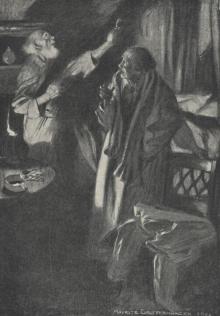 The Monkey's Paw
The Monkey's Paw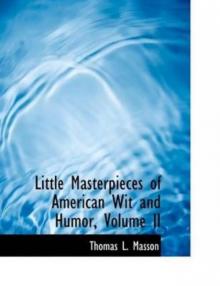 Little Masterpieces of American Wit and Humor, Volume II
Little Masterpieces of American Wit and Humor, Volume II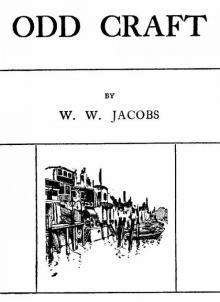 Odd Craft, Complete
Odd Craft, Complete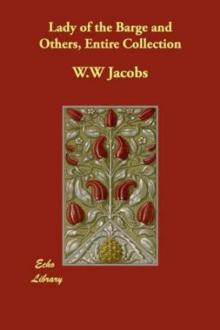 The Lady of the Barge and Others, Entire Collection
The Lady of the Barge and Others, Entire Collection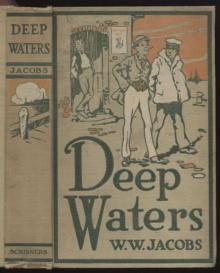 Deep Waters, the Entire Collection
Deep Waters, the Entire Collection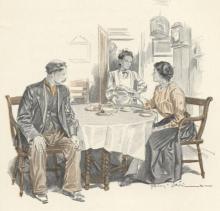 Three at Table
Three at Table Light Freights
Light Freights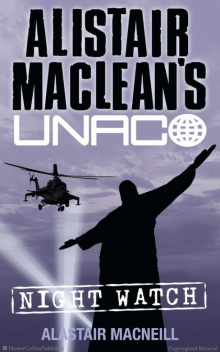 Night Watches
Night Watches The Three Sisters
The Three Sisters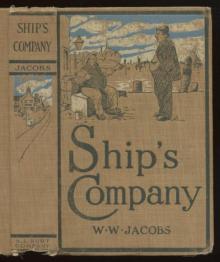 Ship's Company, the Entire Collection
Ship's Company, the Entire Collection His Lordship's Leopard: A Truthful Narration of Some Impossible Facts
His Lordship's Leopard: A Truthful Narration of Some Impossible Facts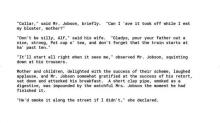 Fine Feathers
Fine Feathers My Man Sandy
My Man Sandy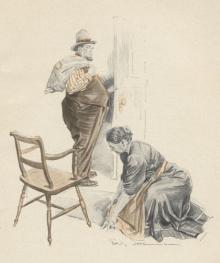 Self-Help
Self-Help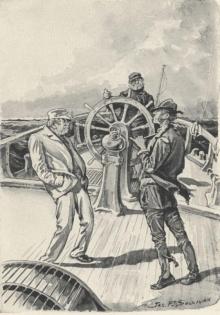 Captains All and Others
Captains All and Others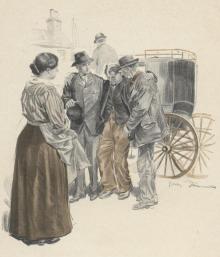 Back to Back
Back to Back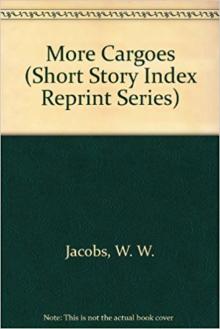 More Cargoes
More Cargoes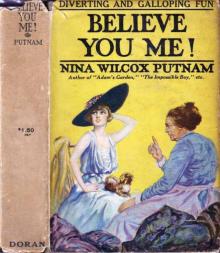 Believe You Me!
Believe You Me!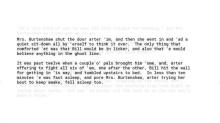 Keeping Up Appearances
Keeping Up Appearances The Statesmen Snowbound
The Statesmen Snowbound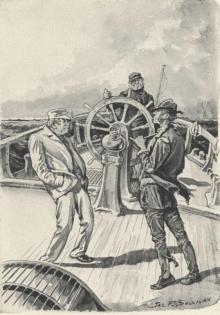 An Adulteration Act
An Adulteration Act The Old Soldier's Story: Poems and Prose Sketches
The Old Soldier's Story: Poems and Prose Sketches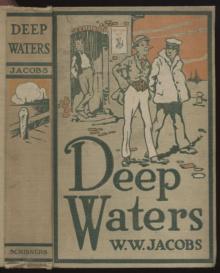 Husbandry
Husbandry Love and the Ironmonger
Love and the Ironmonger The Old Man's Bag
The Old Man's Bag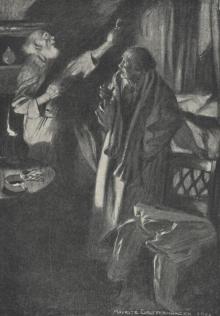 Dirty Work
Dirty Work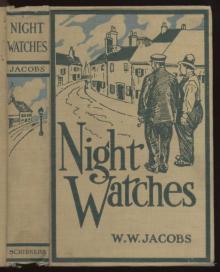 Easy Money
Easy Money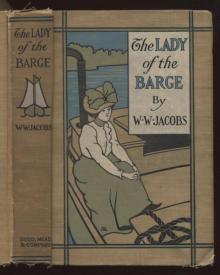 The Lady of the Barge
The Lady of the Barge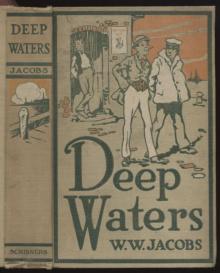 Bedridden and the Winter Offensive
Bedridden and the Winter Offensive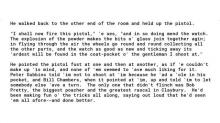 Odd Charges
Odd Charges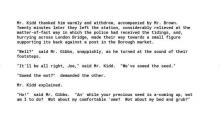 Friends in Need
Friends in Need Watch-Dogs
Watch-Dogs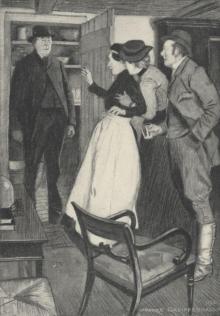 Cupboard Love
Cupboard Love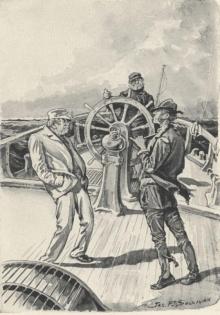 Captains All
Captains All A Spirit of Avarice
A Spirit of Avarice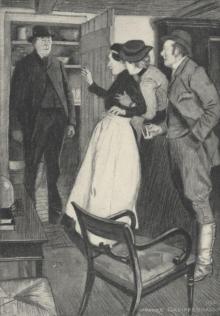 The Nest Egg
The Nest Egg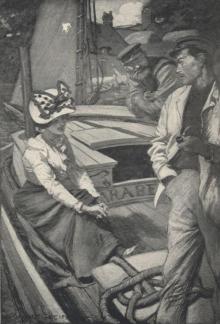 The Guardian Angel
The Guardian Angel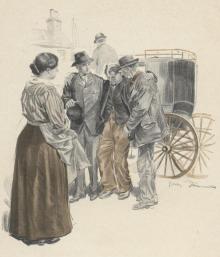 The Convert
The Convert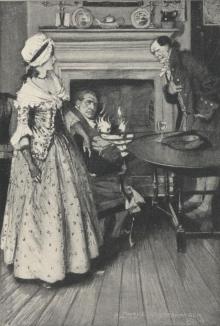 Captain Rogers
Captain Rogers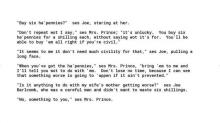 Breaking a Spell
Breaking a Spell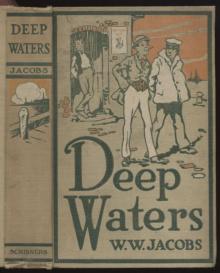 Striking Hard
Striking Hard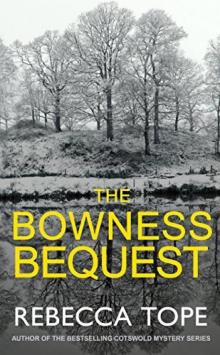 The Bequest
The Bequest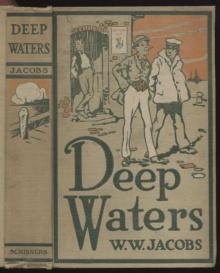 Shareholders
Shareholders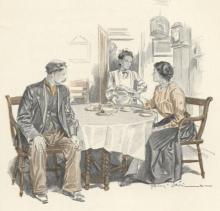 The Weaker Vessel
The Weaker Vessel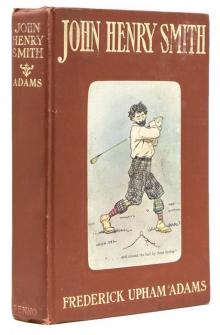 John Henry Smith
John Henry Smith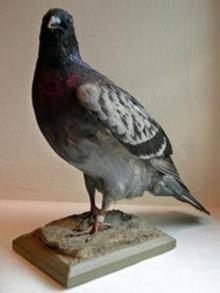 Four Pigeons
Four Pigeons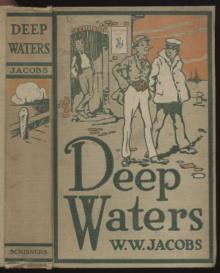 Made to Measure
Made to Measure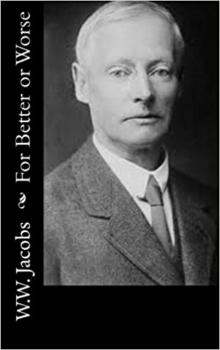 For Better or Worse
For Better or Worse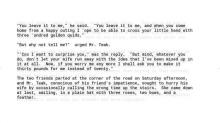 Fairy Gold
Fairy Gold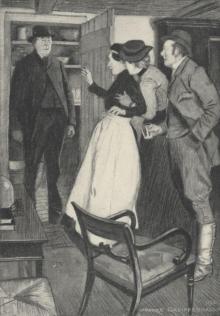 Family Cares
Family Cares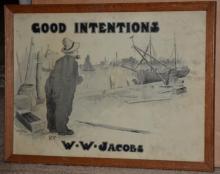 Good Intentions
Good Intentions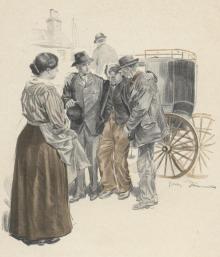 Prize Money
Prize Money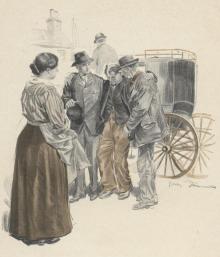 The Temptation of Samuel Burge
The Temptation of Samuel Burge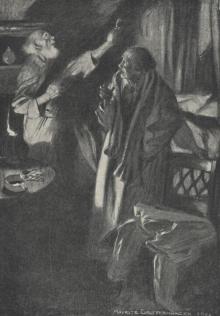 The Madness of Mr. Lister
The Madness of Mr. Lister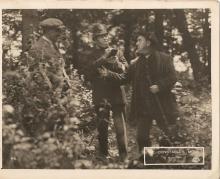 The Constable's Move
The Constable's Move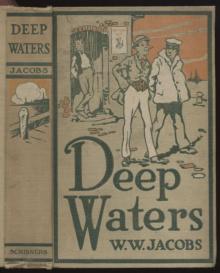 Paying Off
Paying Off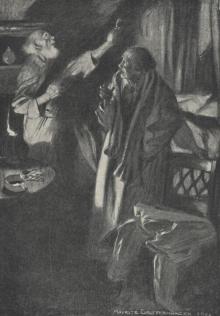 Double Dealing
Double Dealing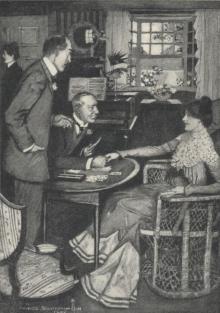 A Mixed Proposal
A Mixed Proposal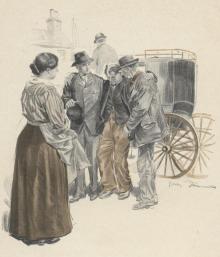 Bill's Paper Chase
Bill's Paper Chase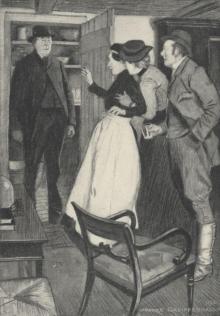 The Changing Numbers
The Changing Numbers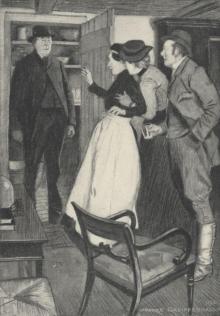 Over the Side
Over the Side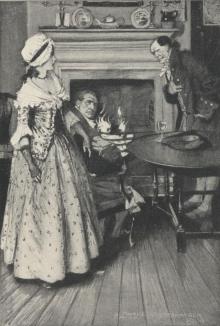 Lawyer Quince
Lawyer Quince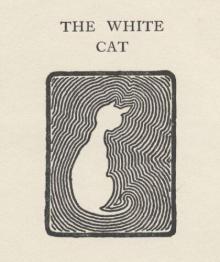 The White Cat
The White Cat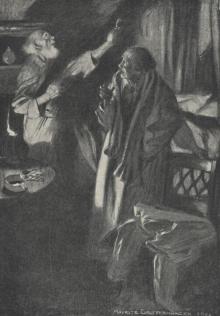 Admiral Peters
Admiral Peters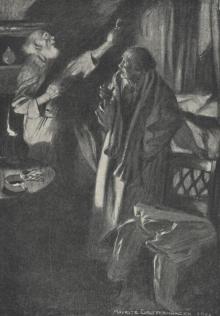 The Third String
The Third String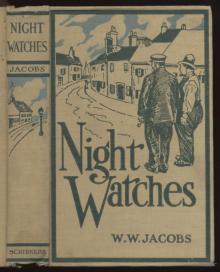 The Vigil
The Vigil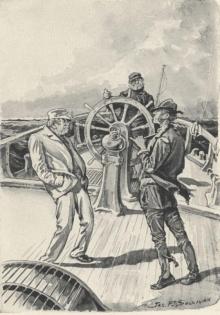 Bill's Lapse
Bill's Lapse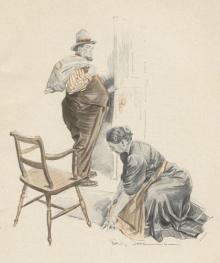 His Other Self
His Other Self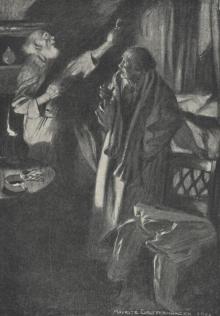 Matrimonial Openings
Matrimonial Openings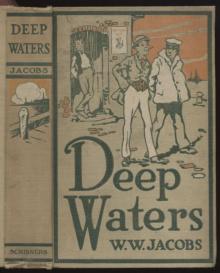 The Substitute
The Substitute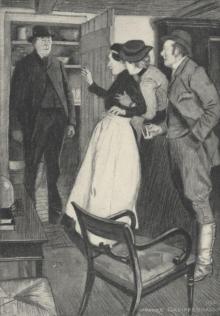 Deserted
Deserted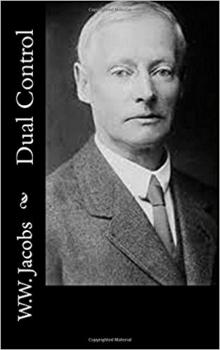 Dual Control
Dual Control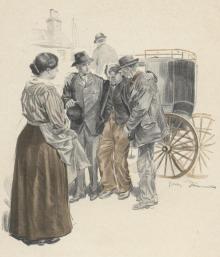 Homeward Bound
Homeward Bound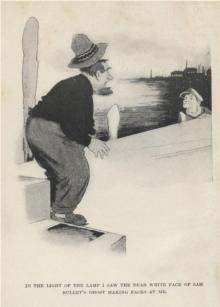 Sam's Ghost
Sam's Ghost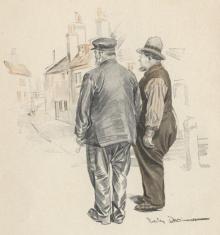 The Unknown
The Unknown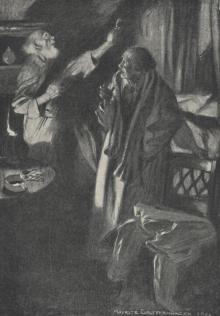 Stepping Backwards
Stepping Backwards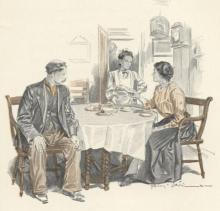 Sentence Deferred
Sentence Deferred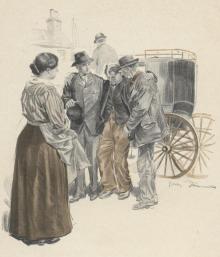 The Persecution of Bob Pretty
The Persecution of Bob Pretty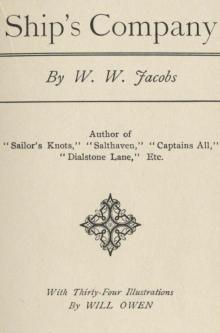 Skilled Assistance
Skilled Assistance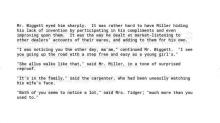 A Golden Venture
A Golden Venture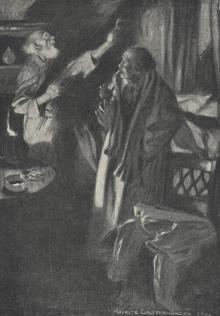 Establishing Relations
Establishing Relations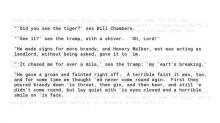 A Tiger's Skin
A Tiger's Skin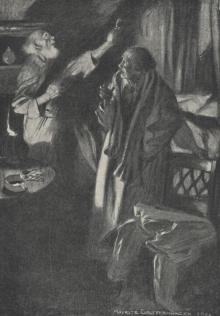 Bob's Redemption
Bob's Redemption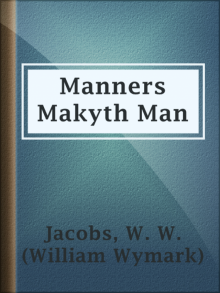 Manners Makyth Man
Manners Makyth Man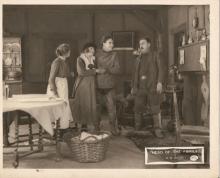 The Head of the Family
The Head of the Family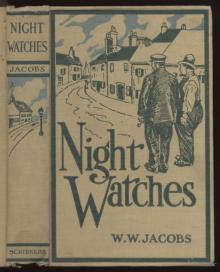 The Understudy
The Understudy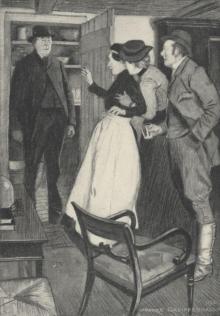 Odd Man Out
Odd Man Out Once Aboard the Lugger-- The History of George and his Mary
Once Aboard the Lugger-- The History of George and his Mary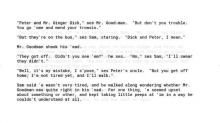 Peter's Pence
Peter's Pence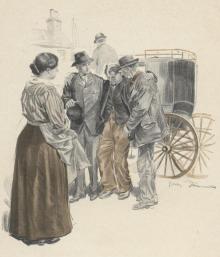 Blundell's Improvement
Blundell's Improvement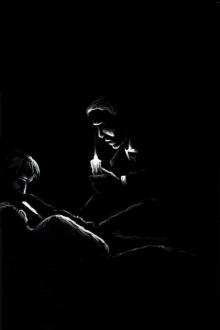 The Toll-House
The Toll-House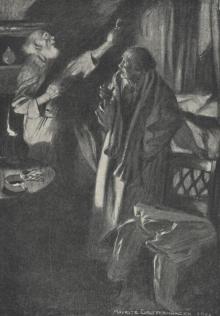 Dixon's Return
Dixon's Return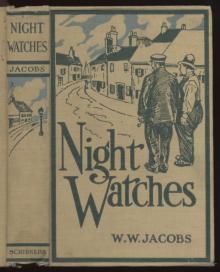 Keeping Watch
Keeping Watch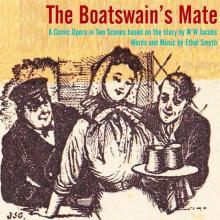 The Boatswain's Mate
The Boatswain's Mate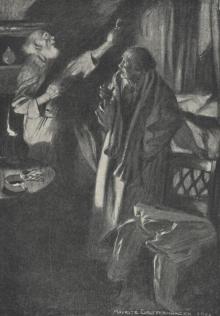 The Castaway
The Castaway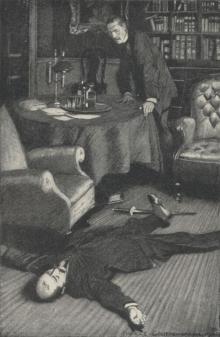 In the Library
In the Library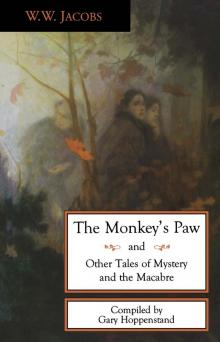 The Monkey's Paw and Other Tales Of Mystery and the Macabre
The Monkey's Paw and Other Tales Of Mystery and the Macabre